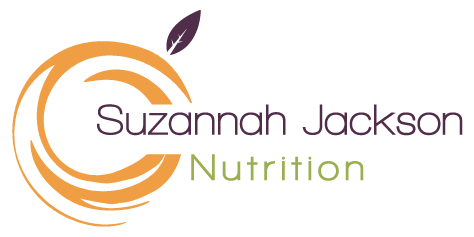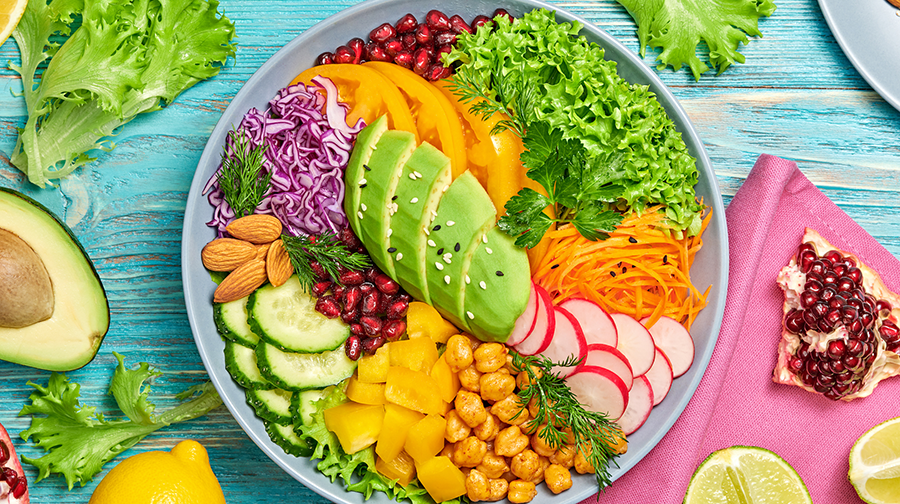Being Vegan
Being vegan is really fashionable right now, and those in favour of this way of eating will tell you that it’s the absolutely healthiest diet you can have from a nutritional perspective, plus you get to save, not only the lives of animals but the planet, too. For most people, it is a bit of a stretch to go from where you are now to a 100% vegan diet. In this blog, I’m going to look at it from all view points; what it means to be vegan, what’s great about it, what’s not so good, where you might struggle – and I’ll also be giving you tips for getting started, whether your intention is to immerse yourself fully or if you just fancy dabbling – either is fine.
There is no set macro or micro nutrient ratio for a vegan diet; just vegetables, grains, fruit, nuts, seeds and any other foods made from plants. However, since the main vegan protein sources are pulses and grains, and only a combination of the two provides complete proteins (containing all the amino acids), this can be a high carbohydrate diet by definition.
Is being vegan healthy?
Good question! A vegan diet doesn’t necessarily mean a healthy diet.
Although vegans commonly take an interest in how diet relates to health and tend to educate themselves about nutrition, the vegan diet does not explicitly prescribe healthy foods. There is a vegan alternative for every junk food out there. And you can live on white toast with margarine and jam (and see your blood sugar levels sky rocket) while still being vegan – and that is certainly not healthy.
One thing that everyone agrees on is that the following is healthy:
- Enjoy an abundance of freshly prepared vegetables
- Minimise processed foods and instead cook meals from scratch
- Eat mindfully and slowly
- Choose local, organic foods
Given the vast majority of health complaints are linked to chronic inflammation and a plant-heavy, antioxidant-rich vegan diet will go some way to mediating inflammation, it will certainly not hinder your attempts to be healthy. Given we don’t eat nearly as much fibre as we should for optimum health, committing to eating more veg is only going to be a good thing.
ADVANTAGES OF GOING VEGAN
- Cruelty-free
- Promotes natural foods
- Rich in vitamin C and fibre, plus other plant chemicals
- Helpful for some health conditions (rheumatoid arthritis, multiple sclerosis, other auto-immune conditions).
DISADVANTAGES OF GOING VEGAN
- Natural food is not a requirement to comply with the diet
- Does not explicitly encourage healthy eating patterns
- May be nutrient deficient (B12, haem iron, omega-3 fats, complete protein)
- Often high in carbohydrates
- Can be too low in protein, especially if you’re stressed or recovering from adrenal fatigue
- Does not limit or exclude sugar
- Not suitable for elderly, pregnant women, type 2 diabetics, or those with high triglycerides or carbohydrate intolerance
- May or may not be effective for weight loss
Things to be mindful of on a vegan diet
- Vegan diets don’t provide the fat soluble vitamins A and D. You can’t get vitamin A from carrots. What you get is beta carotene, which is the precursor to vitamin A.
- You may have heard that carotene can be converted into vitamin A, but this conversion is usually insignificant. First, it takes a huge amount of carotene to convert create amount of actual vitamin A. And, if you have low thyroid function, impaired digestion or a lack of healthy fats in the diet, this conversion won’t happen at all.
- Vegan diets (unless you’re eating a lot of natto – a kind of fermented soy) don’t give you the vitamin K2. This is needed for shuttling calcium into your bones.
- Many people try to be vegan by relying on fake food – they replace milk, cheese and meat with foods manufactured to look and taste as though they are milk, cheese and meat. Since food manufacturing is not like magic, what is used is non-foodstuffs, including stabilisers, gums, thickeners and highly processed protein extracts. Moreover, you may be counting your vegan cheese in as a source of protein, when many of them are actually made from carbs.
- Vegan diets are low on vitamin B12 and iron. The readily-absorbed forms of these nutrients are found in animal products. Studies have suggested that it is common in some vegans to be deficient in vitamin B12.
- Several studies have also shown that both vegetarians and vegans are also prone to deficiencies in calcium, iron, zinc, and essential fats .
How to get started on a vegan diet
Some people like to make changes all in one go. If this is you, choosing a good vegan recipe book will be helpful – there are plenty out there to choose from.
Or you might try changing one meal at a time – possible having a vegan breakfast during your first week, adding a vegan lunch during week two and so on.
You might try changing one product at a time, for example, swapping traditional cow’s milk for almond milk, or butter for coconut oil. There’s a plant-based alternative for most things you can think of.
One thing that you can look forward to is some exciting new recipes. Bringing the principles of being vegan into your life even a few days a week will deliver a whole new taste experience. There will be things that you love – and things the family rejects. It’s all part of the fun of discovering new things.

